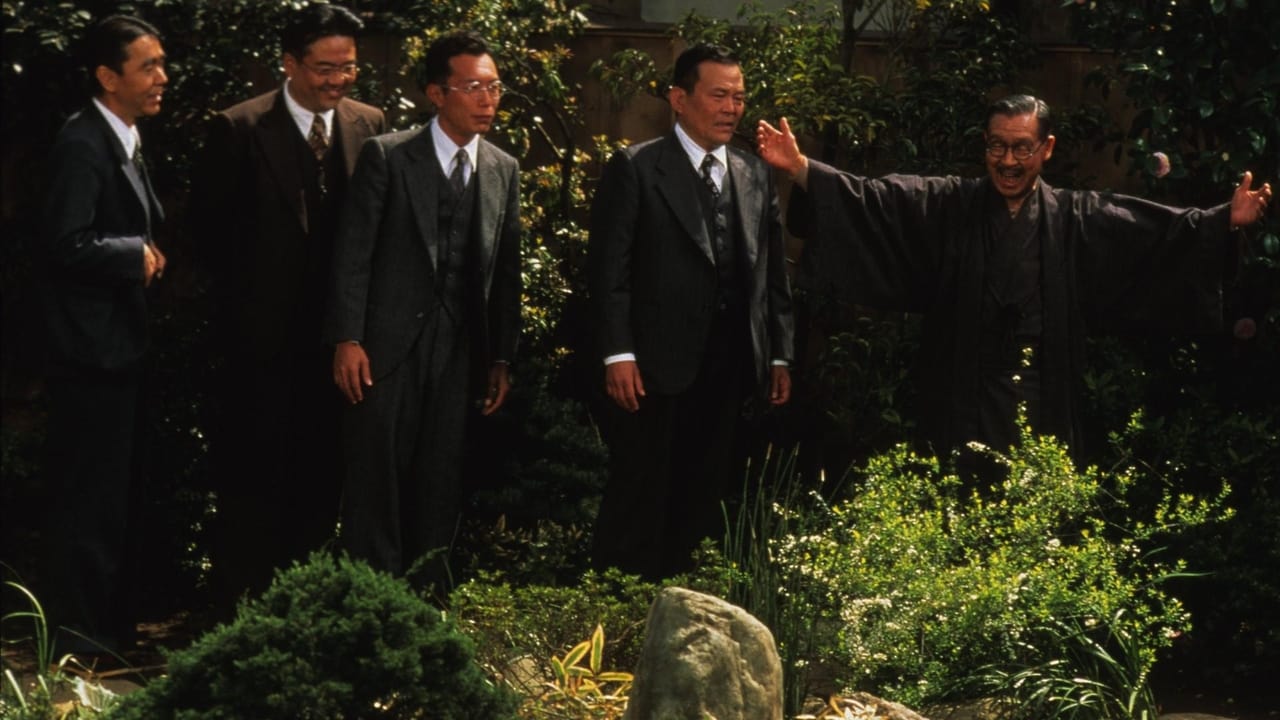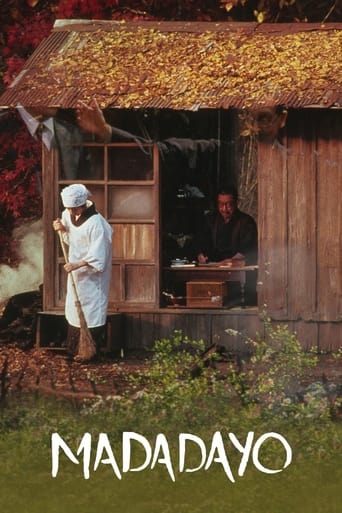



How sad is this?
Each character in this movie — down to the smallest one — is an individual rather than a type, prone to spontaneous changes of mood and sometimes amusing outbursts of pettiness or ill humor.
View MoreOne of those movie experiences that is so good it makes you realize you've been grading everything else on a curve.
View MoreClose shines in drama with strong language, adult themes.
View MoreMadadayo was last movie of legendary director Akira Kurosawa, and what a great way to end fantastic directing career spanning 50 years. I have watched nearly more than half of his work, but somehow i didn't watched Madadayo to this day, and i have missed a lot, this movie is beautiful. It is long and slow paced like many others Kurosawa's movies, but it's worth in the end, ending is simply beautiful it is sad but peaceful at the same time, like every other natural death. The most i like in this movie is the message to be good in your life to yourself and to others and you will live the peaceful quite life to the end, the connection of professor with his students is very touching, from beginning to the end. I see that many people complain on the part of the movie with missing cat, but i also like that part, and see the coming of new cat as metaphor for never ending circle of reincarnation. I am really recommending this movie to all lovers of Akira Kurosawa's work and Japanese cinema, and to all people who still have soul and heart, i am not recommending to people who don't like slow paced movie and movie with many dialogues. My grade 8/10.
View MoreThe question 'are you ready, are you ready to die?' is answered, as a commonplace, in the negative. Who of us is ready to die? None. Even old age, the harbinger of defeat, cannot accept the fate it portends: an untimely death, for all death is untimely. There is acceptance of death, sure, but no one, save the seldom few who are most miserable, invites it into their home. To me it is a truism that there is nothing more lucid and apparent and viscerally vocal than our united cry - Madadayo! But there is something more at play in this film than this pithy commonplace, something deeper. It is a masterpiece, and one sadly overlooked in his dense oeuvre.Why are you not ready to die? Here is the broader and more philosophical inquiry at the heart of this movie; and I invite you to look into your own life and recall the opulence of emotion in your most miserable moments, and to ask yourself unflinchingly why, if the egregiousness truly stacks above your head, like the loss of a beloved cat named Nora, do you continue to live in this world. What is the cause behind your proclamation - Madadayo! Is it affirmative, or is it a resignation? Misery befalls us all. But is misery all there is? Of course not, and Kurosawa rightly thinks not: "There is an enviable world of warm hearts." The professor tells it to us himself: he would have sunk into the mire of his despair had it not been for the kindness and generosity of his friends and relatives, and even those strangers unfamiliar with his plight.He has a crisis when he loses the cat and another one in the shack. Both times he is saved by his friends. There is much that happens in a man's life, much of it good, much ambivalent; he sees many evils and performs some, regrettably, himself.But the answer is there, in our lives, staring us in the face. Why are you not will to say you are ready for death? The world of warm hearts is astoundingly beautiful. It is beautifully portrayed in the movie, with heartfelt earnestness in the manner in which the students revere and support their professor; but, more to the point, it is also intrinsically beautiful. In the final scene the professor, now an old man, dreams himself a boy, a remembrance perhaps, and finds himself playing a game of hide and seek with some friends on a farm among conical stacks of hay. The boys on the road call out to him continuously, are you ready? as he tries to find a suitable hiding place among the hay. Madadayo (not yet) he exclaims to them. He then slowly covers himself with hay and just as he is about to say that he is ready for them (ready for death) the sun sets over the horizon of a surreal landscape imbued with green, orange and red, a multicoloured dream, and the camera pans up and over the sky, and it is here that we see the beauty of the world; it is this beauty, which is joined with the ethical, the kindness of people, that stops the young boy and the old man from saying that they are ready; it is this solemn beauty that keeps us all going, if we should choose, in our carousals and sojourns, to take notice of it. You are left with a broad smile on your face as you take leave of this master, and every time I think about him I am happy for the life he lived and sad that he departed us so soon.
View MoreMadadayo was the final film Kurosawa made and the film itself is about the process of life itself and the passage of time as the director himself was contemplating his own mortality, since he was well over 80 years old by the time he directed this film and only at that age he was at the optimal position to direct a film like this. Several of his other late films (those that he filmed after ca. 1980) deal with the process of aging, such as Ran, which is an epic film about an ageing feudal lord, here we have a much more personal work about an aging professor.The subtitles of this film are rather bad, at the least the ones that I had, since a friend of mine who spoke Japanese noticed several errors and the lack of details required to understand the film. So it would be a 7/10 film for those that don't speak Japanese.
View MoreA fitting conclusion to Mr Kurosawa's career. Full of quiet melancholy and contemplation this film is, in my opinion, quite aware that it is the director's last. It deals solemnly with death, love, admiration and loyalty. Madadayo meaning not yet, tells the story of a retired German grammar teacher whose small group of devoted students grows exponentially every year along with the parties and gatherings in honour of him. The silence in the film allows the relationships between the characters to become gripping and though there is little action the audience begins to care about the teacher as much as the students. The film also contains just the correct amount of humour to counteract the more melancholic, contemplative elements of the story. My only main criticism is that the segment dealing with the lost cat is perhaps just slightly too long. While contributing greatly to the pathos in the film I believe if this part of the film were shortened by a little balance would be restored between pathos and merriment.
View More